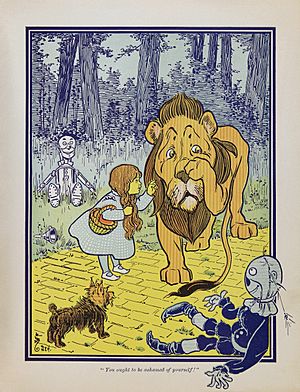Cowardice facts for kids
Cowardice is when someone is so afraid that they don't take a risk or face danger. It's the opposite of being brave or having courage. When we call someone a "coward," it means they didn't show enough strength when things got tough.
Being brave is often seen as a good thing in many societies. Because of this, cowardice is usually seen as a weakness. Not facing your fears can sometimes lead to people looking down on you or even facing consequences.
What Does "Coward" Mean?
The word coward came into English from an old French word, coart. This word combined "tail" (like an animal's tail) and a suffix meaning "one who has." So, it might have meant "one with a tail."
Imagine an animal showing its tail when it runs away in fear. Or think of a dog putting its tail between its legs when it's scared. This word came to England after the Norman conquest of England in 1066.
Interestingly, the English last name "Coward" (like in Noël Coward) has a different origin. It means the same as "cowherd," which is someone who looks after cows.
Cowardice in the Military
In the military, acts of cowardice have always been taken very seriously. Military rules define many actions as cowardly. These can include running away from the enemy or giving up to the enemy when told not to.
The penalties for such actions are usually very strict. In the past, these could range from physical punishment to the most severe penalties.
For example, during World War I, soldiers found guilty of cowardice often faced very serious consequences. Many were put on trial by military courts. In the UK, soldiers who faced these penalties were often not remembered on war memorials. Their families also faced difficulties and social stigma.
However, many years later, these soldiers received official pardons in the UK. They are now remembered with the Shot at Dawn Memorial. This memorial helps people remember those who faced the ultimate penalty for military offenses.
Unlike some other countries, the U.S. military tried soldiers for cowardice but did not carry out the ultimate penalty during World War I.
See also
 In Spanish: Cobardía para niños
In Spanish: Cobardía para niños
 | Selma Burke |
 | Pauline Powell Burns |
 | Frederick J. Brown |
 | Robert Blackburn |


